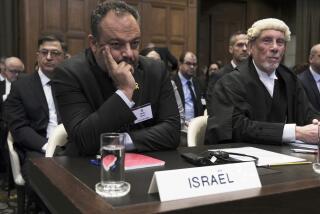Milosevic Genocide Charges Are Confirmed
- Share via
AMSTERDAM — The U.N. war crimes tribunal in The Hague has agreed to hear genocide charges against former Yugoslav President Slobodan Milosevic for alleged atrocities during the 1992-95 Bosnian war, a spokeswoman said Friday.
Milosevic, who led Yugoslavia through four Balkan wars in the 1990s, already faces two indictments accusing him of war crimes in Croatia and in Kosovo, a province of Serbia, the dominant republic of Yugoslavia. But the Bosnia indictment was the first to include genocide, the most serious crime in the tribunal’s statute.
Tribunal Judge Richard May on Thursday confirmed the Bosnia indictment, submitted by prosecutors Nov. 12 after years of preparation, said prosecution spokeswoman Florence Hartmann.
The tribunal defines genocide as “acts committed with intent to destroy, in whole or in part, a national, ethnical, racial or religious group.” Those acts include murder, inflicting living conditions designed to eliminate a group, preventing births or transferring children from one group to another.
The new indictment charges Milosevic with 29 counts, including genocide, complicity to commit genocide, crimes against humanity and grave breaches of the Geneva Convention, Hartmann said.
It alleges that Milosevic “participated in a joint criminal enterprise, the purpose of which was the forcible and permanent removal of the majority of non-Serbs from large areas of” Bosnia-Herzegovina.
It includes responsibility for the killings of at least 7,000 Muslim men and boys in the U.N.-declared protected zone of Srebrenica in July 1995. Thousands of Bosnian Muslims and Croats were held at more than 50 detention centers in “inhuman conditions.”
“The total number of people expelled or imprisoned is estimated at over a quarter million,” the prosecution said.
In Bosnia, government officials said the new charges will serve as a warning to war crimes perpetrators that they will face justice. “The indictment of one man cannot return all the dead people or fix the ruins, but it can . . . send a message to others that they won’t get away with crimes,” said Foreign Ministry spokesman Amer Kapetanovic.
More to Read
Sign up for Essential California
The most important California stories and recommendations in your inbox every morning.
You may occasionally receive promotional content from the Los Angeles Times.












